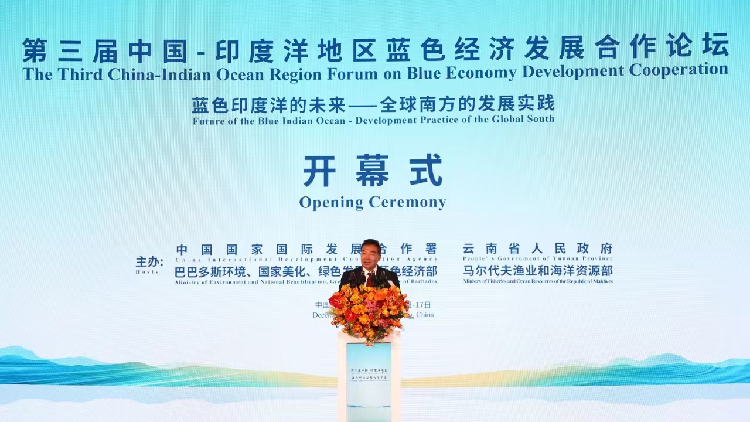China and Indian Ocean Nations Look to Expand Collaboration on Blue Economy
China and countries bordering the Indian Ocean are looking to enhance their collaboration in the blue economy sector.

The third China-Indian Ocean Region Forum on Blue Economy Development Cooperation took place in Kunming, the capital of Yunnan Province in southwest China. The forum centered on significant marine issues, including fisheries, connectivity, disaster prevention, climate change governance, marine energy, and ecological protection.
"We are willing to work with all parties to continue mobilizing resources, implementing the Global Development Initiative and the Antigua and Barbuda Agenda in an integrated manner, and fully supporting small island nations in achieving more resilient and lasting prosperity," said Luo Zhaohui, chairman of the China International Development Cooperation Agency, during his remarks at the opening ceremony.
The three-day event, organized by CIDCA, brought together over 300 participants, including government officials, experts, business leaders, and representatives from international organizations.
"Comoros and China share excellent cooperation. In 2022, we signed a memorandum of understanding on the blue economy. This forum provides a great opportunity to implement the agreement and jointly explore maritime resources," noted Maoulana Charif, the ambassador of the Union of Comoros to China, in an interview with CN.
A significant feature of this year's forum was a government-business dialogue, during which officials and representatives from Chinese enterprises explored ways to enhance international collaboration by involving multiple stakeholders. International organizations underscored their roles in fostering cooperation in the region.
"We are multilateral investment banks. We have a lot of investments," remarked Rodrigo Salvado, director general of AIIB's operational partnership department.
"We provide cheaper and longer-term financing for all these projects, such as fixing oceans and repurposing ports. Those things take money and time, and we are here to provide that type of financing, which actually makes sense for the developing countries," Salvado noted.
In recent years, under the banner of South-South cooperation, China has actively supported small island nations in their efforts to combat climate change through various projects, including an electric bus initiative in Mauritius, a desalination project in the Maldives, and the establishment of a low-carbon demonstration zone in Seychelles. Forum participants expressed optimism that this gathering, which unites diverse partners, will propel stronger momentum for the development of the Global South.
"Through cooperation with China, I see the importance and significance of advancing our objective of developing the emerging sectors, like marine biotechnology, circular economy, aquaculture, and also among the renewable energy sector. China can also play a very pivotal role in research, especially in marine scientific research," shared Phillianne Ernesta, an official from the Seychelles' Ministry of Fisheries and the Blue Economy.
The forum also marked the inauguration of the China-Indian Ocean Region Marine Cooperation and Training Center, an important step toward enhancing regional collaboration.
As part of the forum's initiatives, from 2024 to 2026, China will assist in training 20,000 "blue talents" for Indian Ocean nations and establish "Climate Colleges" in partnership with regional universities.
In the closing ceremony, Beate Trankmann, resident representative of UNDP in China, expressed the organization's readiness to collaborate with China and other nations to protect and restore vital ecosystems, including the ocean, while integrating sustainable development into the blue economy.
"No country can achieve this alone. Only through shared determination and international cooperation can we address the challenges of our time and realize the vision of the 2030 Agenda," Trankmann asserted.
Sanya Singh for TROIB News
Find more stories on Business, Economy and Finance in TROIB business












